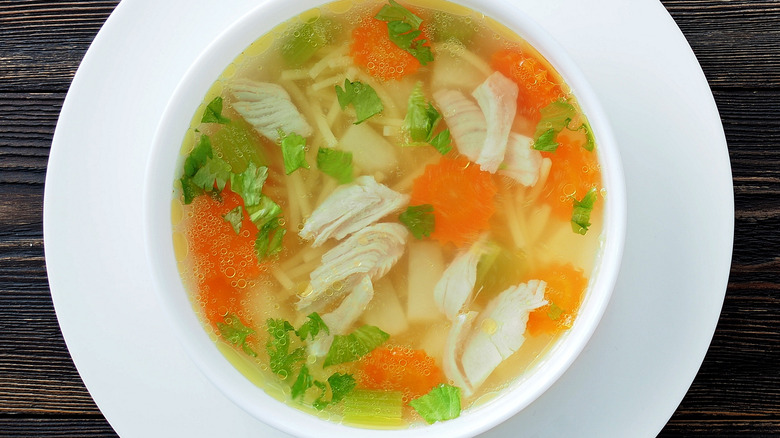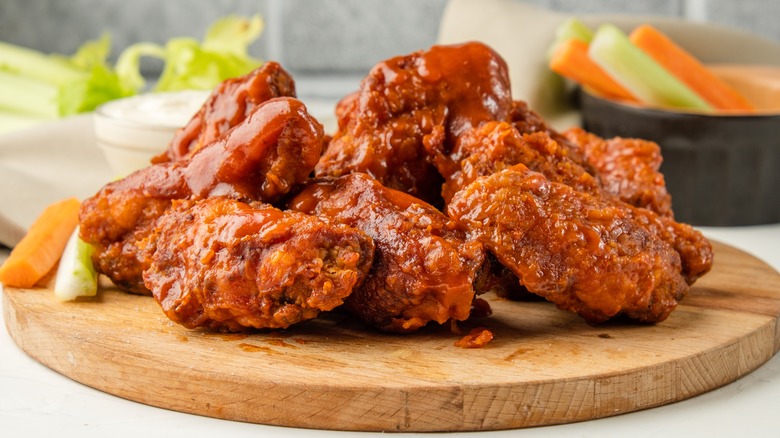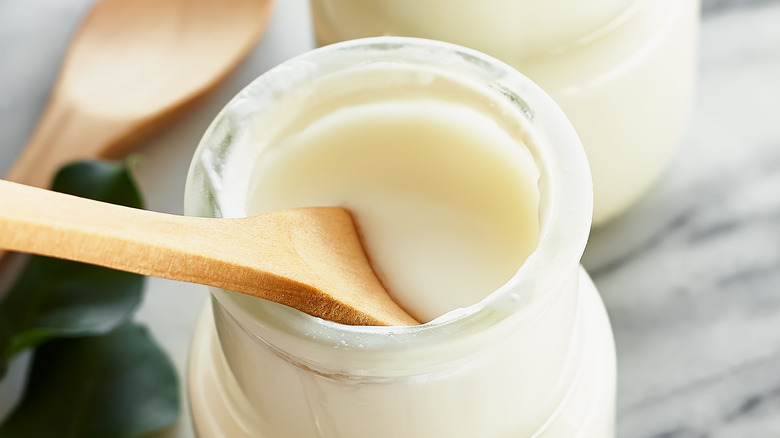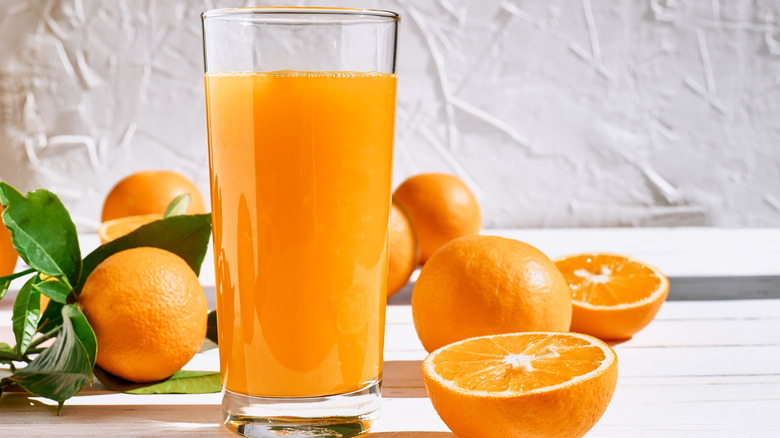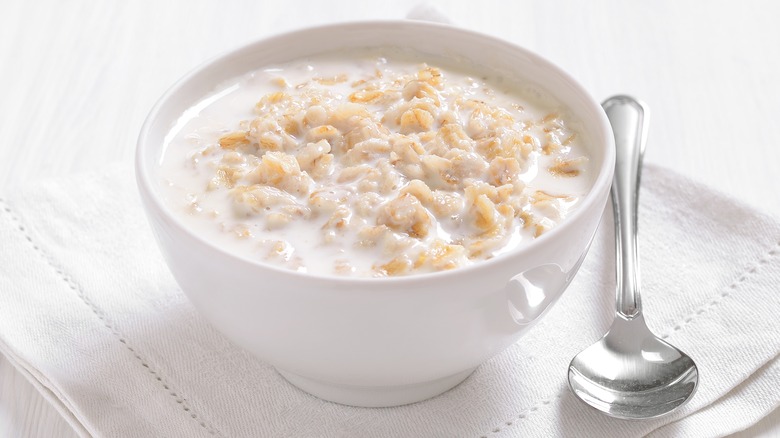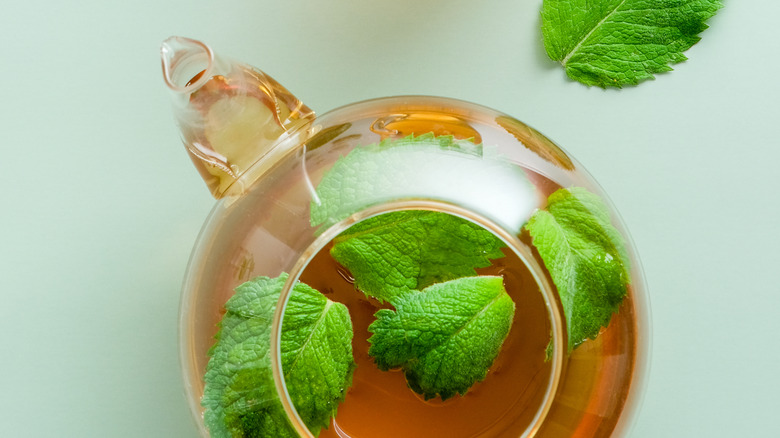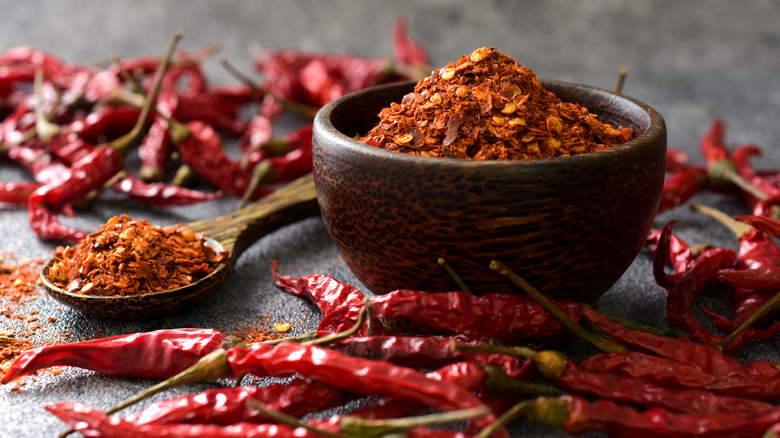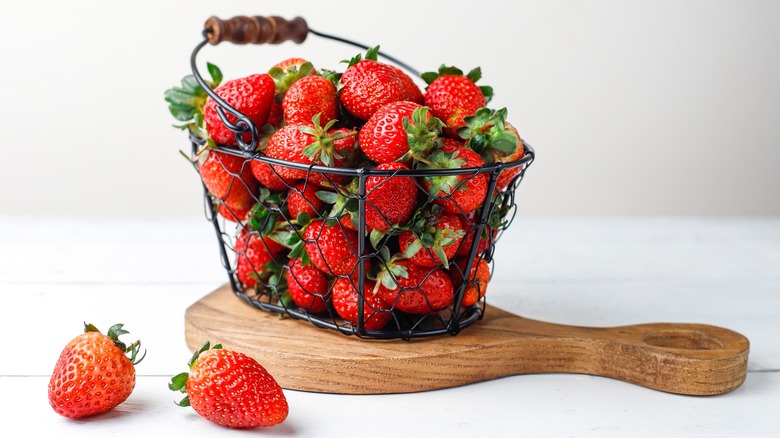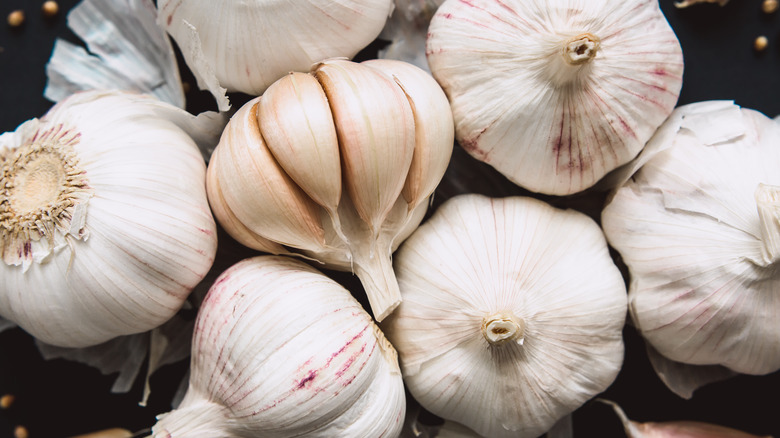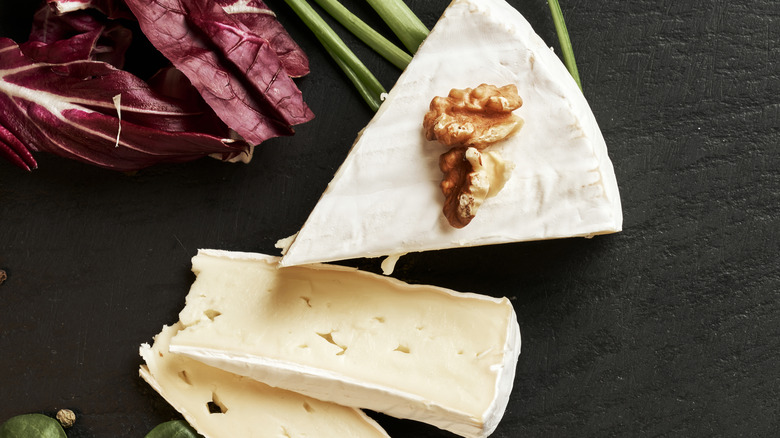7 Foods To Eat And 7 To Avoid When You Have The Flu
Gee, the seasons sure do roll around quick, huh? One moment, you're basking in the blazing sunshine with your pals on the porch; the next, it's freezing cold, and you're feeling that familiar tickle in your throat. Now, if you're lucky, that seasonal bug you just picked up is nothing but a common cold, but for many unfortunate folks out there, you could be dealing with a case of the flu.
Due to their similar symptoms, telling the difference between a cold and the flu can be a tricky thing to do, but a clue might be if you're experiencing the telltale sudden signs of fever, nausea, and fatigue, in addition to more cold-like symptoms like a cough or sore throat (per the CDC). And unlike a cold, the flu can take you out of your day-to-day activities pretty quickly, due to its increased severity. All of this makes choosing the right foods (and avoiding the wrong ones) essential, to ensure that you're eating to bolster your immune system and get you back to full health as soon as possible. And here at Health Digest, we've got the lowdown on the best and worst foods to guide you through the flu. Grab your box of tissues, and let's get started.
Eat: Chicken soup
If we had a penny every time someone recommended chicken soup to us when we were sick, we'd have ... a fair few pennies. But as it turns out, when you have the flu, it truly is one of the best things to keep on the menu. Chicken soup's unique combo of chicken, carbs, liquids, and veggies makes it a virtual elixir for flu-ridden folks (via WebMD). "It's all about the ingredients," points out Beth Israel Deaconess Medical Center's clinical dietitian Sandy Allonen, who discusses the soothing nature of the warm, steamy broth, which not only serves to keep your body hydrated during your sickness but also helps to calm sore throats and ease congestion.
The chicken aspect of the soup provides your body with a good dose of tryptophan, ushering in serotonin production, and making you feel calmer and more comforted (there's a reason why this meal is so darn homely!). And by packing your soup with carrots and celery, you'll be slurping down an enviable flu-fighting combo of minerals, vitamins, and antioxidants. "Not only does this help build a healthy immune system to fight off viruses, it also helps your body recover from illness more quickly," says Allonen. Get us a bowl, stat!
Avoid: Fried chicken
When you're not feeling too hot, it's tempting to rely on your favorite comfort foods to see you through. But reaching for that bucket of fried chicken might be doing you no favors if you have the flu.
Fatty, fried foods like fried chicken and burgers "tend to make you feel worse" when you're experiencing a seasonal illness, according to the Department of Family & Community Medicine at the Baylor College of Medicine's assistant professor of sports medicine Irvin Sulapas (via The Healthy). Fat-heavy food takes longer to digest and will sit in your gut for longer, potentially increasing nausea (per Healthline), which you may experience if you have the flu. Kind of the last thing you want when you're trying to reduce symptoms.
Greasy, fried food can also wreak havoc on your gut microbiome, an essential aspect in the maintenance of a healthy immune system. When your microbiome is in top form, it helps provide signals to keep your immune system functioning properly, and therefore helps fight infections more readily, according to research published in Nature Reviews Immunology. Given that we want our immune systems to be working for us the most when we're laid up with the flu, it's a pretty bad time to knock them out with that chicken thigh.
Eat: Yogurt
Honestly, we can't get enough yogurt at the best of times. But when it's the worst of times, like when you have the flu (okay, yes, we know it's hardly the worst thing in the world, but forgive us for being a little dramatic), it comes into its own. Yogurt is one of the best foods you can eat to support your immune function, and has been shown specifically to have flu-fighting benefits, according to research published in International Immunopharmacology which examined the activation of the immune system against the flu virus in mice.
And that's not the only place where yogurt shines. If one of your flu symptoms is a scratchy, sore throat, yogurt could be an ideal snack. The cooling nature of the yogurt can provide a soothing effect on a sore throat, and its smooth texture means you're not going to aggravate it further, according to K Health. And to top it all off, yogurt is a nutritional powerhouse, packed with probiotics, vitamins, protein, and carbohydrates, all of which have functions to repair the body.
Avoid: Sugary snacks
So, you've got a pounding headache, a sore belly, and a raging cough. You. Deserve. A. Treat. We're not going to argue with that — we're experts in feeling sorry for ourselves when we're sick — but if your version of a treat is a sugar-laden donut or candy bar, we'd recommend you think twice. High amounts of sugar can put a temporary damper on your immune system, says Orange Coast Memorial Medical Center internist Kristine Arthur to Men's Health. This short-term suppression effect on your white blood cells results in your body becoming more susceptible to the effects of a flu virus and makes shifting it from your system take longer.
Sugary snacks are also pretty bad news for folks whose flu symptoms include gastrointestinal issues. "Sugar tends to pull fluid out of the GI tract, which can lead to loose, watery stools and diarrhea," says Arthur. While diarrhea is way more common with stomach flu as opposed to influenza that affects your respiratory system (per Medical News Today), it's always helpful to try and reduce the likelihood of more symptoms wherever possible.
Eat: Orange juice
If you're one of those people who rush to the store to panic-buy a bag of oranges at the first sign of illness (definitely not us, no way, absolutely not), you can probably relate to this one. But when you have the flu and eating solid foods may prove challenging, grabbing a jug of orange juice instead may do the trick.
The first reason is thanks to — you guessed it — its vitamin C content, according to WebMD. The vitamin C that you're drinking with orange juice, especially when it's the pulpy kind, has been shown to both treat and limit respiratory illnesses like the flu, per research published in Nutrients.
The folic acid which you're getting when you drink orange juice can also assist your immune system in staying robust, as Providence discusses. What's more, orange juice, as a liquid, can assist your body in maintaining its hydration levels, which is vital when the flu is working its way through your system.
Avoid: Alcohol
Okay, look. We know how tempting it is. Having the flu sucks, and if you thought you could take the edge off with a nightcap, that bottle of whisky might be looking pretty good. But we implore you to think twice before unscrewing that bottle.
Drinking alcohol when you're ill with the flu can contribute to inflammation, potentially making symptoms worse (per The Healthy). Hitting the booze can also cause your white blood cell response to become weaker. Given that these blood cells serve to fight infection in the body and have a vital function in clearing illness from your system (via the Cleveland Clinic), you don't want to do anything to weaken them.
And if that wasn't bad enough, the dehydrative effect of alcohol is bad news for when you have the flu. "Hydration helps to decrease congestion by preventing your mucus from getting too dry so you are able to get it out of your body," states assistant professor of sports medicine Irvin Sulapas to The Healthy. The effects of alcohol can also be stronger when you're sick, as you may already be a little dehydrated, and so alcohol may be a bad idea on an impairment level, too.
Eat: Oatmeal
When you're sick with the flu, eating can be a real struggle. That's why it's important to opt for simple, easy meals that you know are going to hit the spot nutritionally. Oatmeal is one such dish. A bowl of oatmeal is pretty much the ideal food when you have the flu thanks to its comforting, easy-to-digest nature, and is the go-to meal of registered dietitian nutritionist and "Read It Before You Eat It" author Bonnie Taub-Dix when she's ill, who suggests adding a protein element to help spur healing more effectively (via Prevention).
A few key elements in oatmeal's nutritional composition also make it uniquely suited to fighting infection. Oats and other whole grains are naturally high in vitamin E, which improves immune function, according to Healthline. The beta-glucan fiber that's available in such high quantities in oats is also an immune booster. And oatmeal's antioxidant content, with oats being high in polyphenols, is a further benefit to your immune system, as research published in the Journal of Immunology Research shows. Not bad for a humble bowl, eh?
Avoid: Pastries
For many people around the world, a flaky pastry is an ideal way to start (or end) a day. But when you have the flu, it might be a good idea to leave the croissants and the pain au chocolat in the cupboard. Pastries, as well as other foods made with refined carbs, can inhibit the immune system, making it harder for your body to recover (via EatingWell). Refined carbohydrates may also cause an inflammatory response in the body which, when combined with the inflammation already caused by flu (per The Conversation), might make you feel even more uncomfortable.
It's also worth bearing in mind that pastries, like many processed foods, simply aren't as high in nutrients as whole foods. Eating foods that are nutritious and full of vitamins, minerals, proteins, and carbohydrates is vital in the fight against flu, as well as any illness. Save the pastries for another time, and stock up your fridge with all the goodness you can muster for your fight against this irritating virus.
Eat: Peppermint tea
Although the flu generally manifests through respiratory tract symptoms, every now and again, it can affect your gastrointestinal system, too (per Medical News Today). And when this happens, peppermint tea could be your best ally.
Peppermint tea may help to calm any stomach upset you're experiencing and reduce nausea symptoms, says Mount Sinai. This is thanks to peppermint's slightly numbing effect and menthol's antispasmodic action, which then aids to soothe your GI tract.
Peppermint tea may also limit diarrhea if you're experiencing it as part of your flu (or indeed, if you have stomach flu). If peppermint tea isn't your thing, try taking enteric-coated peppermint capsules to cure what ails you. The advantage of coated capsules is that they can pass through your system to your intestine without the menthol being activated, meaning that the peppermint has a stronger, more beneficial effect on your gastrointestinal tract. One thing to bear in mind, though, is that if you experience GERD, it's pretty unwise to take peppermint, either via a tea or a capsule — the oils in the mint can loosen your esophageal sphincter, worsening symptoms.
Avoid: Coffee (sort of)
When the fatigue that so often comes with the flu hits, it's natural to want a little pick-me-up. But if coffee is your go-to rocket fuel to get you through the day, while you're unwell, it may be best to keep your cafetiére unplunged.
The main issue with drinking coffee while you have the flu is its dehydrating effects. "While you're sick, it's very important to stay on top of hydration to help the body thin mucus [and] replace fluids lost," says registered dietitian Jenny Beth Kroplin (per Well+Good) — and by drinking coffee, you might be causing your body to lose more fluid than it's taking on. There are also coffee's stimulating effects to consider, which might inhibit much-needed rest and sleep that your body requires to recover.
But — and this is a big but — there are certain aspects to coffee that might make it a great drink to have during fluey periods. In fact, if you're feeling lethargic, coffee might be the best thing for it. "The caffeine from coffee can actually help offset that sluggish feeling and boost your mood," Kroplin states, which could be particularly beneficial if you have stuff to do that you can't cancel while you're sick. Coffee is also loaded with polyphenols, powerful antioxidants that not only have an anti-viral effect (begone, flu!) but can also bring down inflammation, allowing the body to heal faster.
Eat: Cayenne
For some people, a meal isn't complete without the spicy kick of cayenne. And for those spice-hounds out there, you'll be pleased to know that when you have the flu, loading up on cayenne pepper is one of the best things you can do.
Cayenne, as well as other spicy foods like horseradish, can be particularly useful to clear sinus congestion, says Livestrong. In cayenne specifically, it's the compound capsaicin that might supply its beneficial effects. In a review from the Cochrane Database of Systematic Reviews, it was observed that a spray created with capsaicin helped to minimize congestion symptoms (although we'd recommend avoiding trying to make a chili spray yourself, for, you know, pretty obvious reasons).
Cayenne has also been seen to lessen other flu symptoms, like coughing, per research published in Respiratory Medicine. Just bear in mind, though, that if your flu is of the stomach variety (characterized by vomiting, stomach cramps, and/or diarrhea, per the Mayo Clinic), eating anything spicy may exacerbate your symptoms. Opting for bland food options that won't aggravate your stomach is best in these situations.
Avoid: Strawberries
Yeah, we know. We weren't expecting to see these here, either. But as it turns out, strawberries may be a pretty unwise thing to eat when you have the flu.
Strawberries are histamine-releasing foods, as Eat This, Not That! points out. Histamine-releasing fruit (which also includes papaya and banana) prompt the release of, you guessed it, histamines in your body, which normally act to remove allergens from the body through a process of sneezing, coughing, or congestion (per WebMD). Naturally, this is less useful when you're already congested from the flu.
However, it may not be the best idea to write off strawberries altogether when you're ailing. While they may trigger a histamine response in some people, these little red fruits are also pretty high in vitamin C, an important vitamin that serves to support your immune system, says WebMD. The antioxidant content of strawberries may also serve to keep your body fighting against the flu virus effectively.
Eat: Garlic
Garlic isn't just good for warding off vampires. It's also pretty effective for giving your flu virus a run for its money.
Garlic is a natural immunity-booster, and has a specific function in boosting your T-cell count, according to Everyday Health. These T-cells assist in fighting viruses in your bloodstream, like cold and flu bugs. In fact, a study published in Clinical Nutrition found that the ingestion of garlic (aged garlic extract, to be precise) worked to reduce the severity of flu and cold symptoms, making it the ideal choice for your next sick day.
But garlic's benefits don't stop there. As a vegetable high in sulfur, garlic also interacts significantly with zinc – a mineral that's important for the immune system — allowing your body to absorb it more readily. Worried about garlic breath? Luckily, there are a few fixes for that. Mouthwash or toothpaste will naturally dislodge the garlicky smell, or for another approach, a quick glass of milk or chewing on some parsley stalks may neutralize the odor (per Colgate).
Avoid: Cheese
Few foods are as comforting as cheese, and when you have the flu, you're gonna need some comfort. But take it from us when we say that a block of cheddar might not be the best choice when you're sick. The reason for this, however, may not be what you think.
Although cheese and other dairy products are typically thought to cause additional mucus production (making congestion worse when you're ill), that's not the case, according to Single Care. The reason why you should avoid cheese is that it takes longer and more effort to digest than other foods, potentially causing additional discomfort with your flu.
By the same token, it might be worth avoiding other high-fat dairy products, like whole milk and ice cream, until you're feeling better. But not all dairy products are created equal for your flu-fighting. If you've got a hankering for it, try some low-fat yogurt, packed with immunity-supporting probiotics and protein to provide your body with the building blocks it needs to recover.


